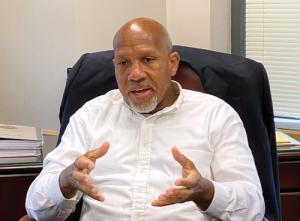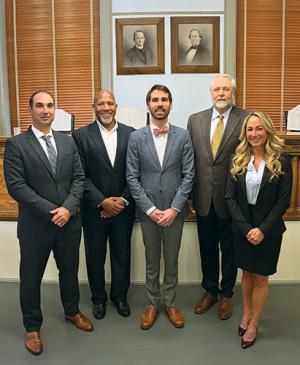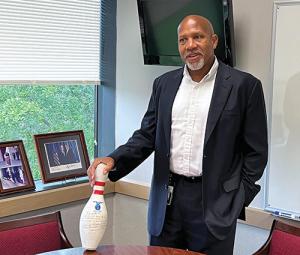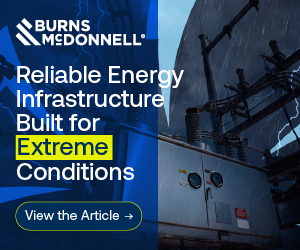State Commissions
Art Graham is a Commissioner for the Florida Public Service Commission.
The Florida Commissioners these days are busy, grappling with the tough subjects of utility ratemaking in the public interest, but also population growth and ensuring all those residents, old and new, have reliable utility services. Enjoy these conversations with Florida Chair Andrew Fay, and Commissioners Art Graham, Gary Clark, Mike LaRosa, and Gabriella Passidomo.

PUF's Lori Burkhart: How are Commissioners appointed in Florida?
Commissioner Art Graham: The appointment process starts with the Nominating Council. The Speaker of the House picks three house members and three citizens. The President of the Senate picks three senators and three citizens. You can't be appointed by the governor unless the Nominating Council nominates you.
Whenever a seat comes available, it's advertised just like any other job vacancy, then the Nominating Council chooses those who will be interviewed. The first time I applied, there may have been sixty or seventy applications.
After holding interviews, they make a recommendation to the governor. They have to send at least three names for every seat available, but sometimes they may send as many as ten. The governor must choose from the list provided.
 Since 1845, the Historic Capitol has symbolized Florida state government. The Commissioners stand in front of a golden oak bench, where sat prior state Commissions and Supreme Courts. From left, Commissioners Mike LaRosa and Art Graham, Chair Andrew Fay, Commissioners Gary Clark and Gabriella Passidomo.
Since 1845, the Historic Capitol has symbolized Florida state government. The Commissioners stand in front of a golden oak bench, where sat prior state Commissions and Supreme Courts. From left, Commissioners Mike LaRosa and Art Graham, Chair Andrew Fay, Commissioners Gary Clark and Gabriella Passidomo.
The Commissioner then takes office pending Senate confirmation, which isn't taken up until the next session of the legislature. If the Senate doesn't confirm by the end of session, you're no longer a Commissioner.
The process is about nine to ten months. It's kind of nerve wracking because anywhere along the line, someone could decide, we don't want that guy.
PUF: At the Commission, do you have ex parte rules and to what extent can you discuss cases with Staff?
Commissioner Art Graham: Technically state law prohibits ex parte communication with parties in most matters before the Commission or expected to come before the Commission within one hundred eighty days.
 Commissioner Art Graham with bowling pin from White House bowling alley.
Commissioner Art Graham with bowling pin from White House bowling alley.
But there's a complete remedy if ex parte communication happens. Let's say I'm in a NARUC conference, talking to somebody in one of the meetings about net metering and next thing you know, somebody else from the State of Florida is talking about it and we're going back and forth.
If that person is affiliated with a party to a net metering issue before the Commission, then I must document the substance of that conversation into the record. Any other party can file a response to the ex parte communication for the record as well. So, ex parte communication isn't illegal if you fix it, but it's still frowned upon. That's a good overall approach to keeping the playing field level.
You can discuss anything you want with Staff, except in rare cases when Staff is a party in a case. Even then, it's only the Staff members assigned to be a party who are off limits for ex parte communications. Our Staff is here to help us get information to make decisions, with almost no constraints.
PUF: What are the top issues facing utilities in Florida right now?
Commissioner Art Graham: My number one issue has always been customer service, and it doesn't matter if it's gas, electric, water, or wastewater. You give a utility monopoly, so customers have no choice, and they need to be protected.
Utilities are compensated in rates for the reasonable cost of customer service. There's no excuse for not having good customer service. There's no excuse for having customers saying, I can't get anybody on the phone, nobody calls back, my bill's wrong every time. I've said that in many hearings.
One of the other big issues is cybersecurity. We saw that issue when the Colonial Pipeline was hacked. It serves the southeast, and fuel costs started going up as a result. If it happened once, it could happen again, with a wider range of consequences.
There are threats that come out all the time. I've talked to utilities about this, and they're working hard to put solutions in place, but realistically that's mitigating the problem and isn't going to completely solve it.
One of my first questions is how do you know if the utility's trying to gold plate this, or just doing what needs to happen? Given the magnitude of the threat, I don't think the utilities are spending more than they need to.
Ask yourself as a regulator, what happens if they do get attacked, or hijacked? The utility's got to get it right every day. The hijackers only have to get it right once. You can't be chintzy when it comes to preparing for cyberattacks.
PUF: Do you feel like the Commission is making a difference in Florida, and how?
Commissioner Art Graham: I definitely do. Florida's always been progressive. When I first got on the Commission, I dealt a lot with water, wastewater. That's where I felt comfortable. A lot of my background, especially working in paper mills, was dealing with the byproducts and effluent coming out of the plant.
I was on the NARUC water committee and found out that most of the things the water committee talked about, we were already doing here in the State of Florida. We were ahead of the curve.
I switched over to electric and found out we were way ahead of the curve there too. It's not a blessing that we have hurricanes come through all the time, but it's a blessing that it's caused us to be so well prepared.
When it comes to weather events, we're like the role model who people come to ask, what do you do about storm hardening? What do you do about preparing for hurricanes and making sure you have a resilient grid? We've been good at that.
PUF: What happens in Florida before and after a storm or a big hurricane coming through that affects your work at the Commission?
Commissioner Art Graham: Utilities' preparation for storms goes on year round, preparing for the next storm season as soon as the current one is over. They're doing a lot of planning, contracting for resources, managing inventories of poles and equipment, and doing impressive storm drills.
But even before that, the PSC is reviewing electric utility storm hardening plans and authorizing recovery of costs. We've been aggressive about storm hardening — the less infrastructure you lose, the quicker you can restore service.
When a storm is approaching, you have to figure out where the storm is coming from and where it's going. It's just like any other weather forecast. If rain is in the forecast there's a good chance it may rain tomorrow, but you don't know for sure, and you don't know where.
Over the twelve years I've been here, you'll see the storm forecasts come in and you'll see various predictions, like, it's going to turn this way. Oh, it's going to turn that way. You have to strategize for different scenarios.
All you can do is be prepared. They'll get the trucks ready to go. There're crews from other states who come down to help, and they have to be staged out of the path of the storm. You have to find hotel accommodations for crews, plus all kinds of other logistics to support an army of line workers. All of that costs a lot of money, and we often have proceedings for cost recovery.
Once the storm passes through and winds have dropped below thirty-five miles per hour, it's a scramble to repair damage and get people back in service as fast as possible. Utilities set up huge base camps with equipment, supplies, and fuel for the trucks. It's very impressive.
It comes down to practice. You learn what works, and doesn't work, and where the improvement opportunities are.
In the past, the IOUs would have their own network of trucks and line crews set up for mutual aid, and contracts for out-of-state crews. The municipals had their own arrangements with other munis. The co-ops had their own set of resources to share among themselves.
Within the state, these groups weren't talking to each other. They were talking to their counterparts in other places. The governor said, this is ridiculous that a municipal is waiting for trucks to come out of Tennessee when a relatively unaffected Florida IOU has a hundred trucks it could spare. Why don't you move these trucks over?
He kind of forced everybody to get on one page and during major storms we had daily talks where everybody got online and said what their problems were. He helped facilitate that. He also would get the highway patrol to escort the movement of trucks in a convoy, getting them around traffic.
When power goes out, nobody's happy and people are tolerant for a day, maybe two, but then that tolerance goes out the window, so there's always a huge sense of urgency.
In 2018, we did a report that found all of this storm hardening, planning, and process improvement had cut storm restoration times by more than half.
PUF: Talk about your work with NARUC and why that's important.
Commissioner Art Graham: NARUC is a way to learn. When I first got here, I was Chair, and this is back after everything tanked in 2009, 2010, and the state was under financial constraints. The senator who was in charge of our budget said, I don't want any travel.
He found out we had six people going to NARUC in D.C. He was upset. I said, I can assure you, nobody wants to go to D.C. in the middle of February. This is no junket, and we're under so much public scrutiny.
I had four new Commissioners. The only way to learn what's going on is to go to a NARUC conference and learn. You don't want us only sitting down and talking to our IOUs to learn. We either learned from NARUC or we learn from industry, and he understood why we were doing it. The NARUC travel was approved.
NARUC is so important to the effectiveness of state Commissions. There's nowhere else to get the valuable knowledge and wider perspective it provides. Without it, Commissioners wouldn't really grow into the job. In my twelve years, we've become much more engaged with NARUC, and we have a much more capable Commission as a result.
When I got here, we were bombarded all the time by our legislators. They were harping on us, giving us a hard time. Over time, they got to the point where now we're a resource. Now they ask our opinions of proposed legislation, and ask for help, as it should be. I'm putting a lot of time into NARUC these days, because I believe in its value.
PUF: Looking ahead, where do you see the utility industry going in the next five or ten years, in Florida?
Commissioner Art Graham: More renewables are coming on board. In Florida, that generally means solar, although other renewable technologies and enabling complementary technologies are coming over the horizon.
We've already grown by leaps and bounds the last two to three years and I see that continuing. We have one utility that has pledged thirty million solar panels by 2030, which a couple of years ago was really impressive. Now it looks like by the time we get to 2030, their goal of thirty million panels will seem awfully dated — they're blowing past their benchmarks. The other three large IOUs are following suit, so you'll see a lot more solar.
I want to see more diversity. We're quite dependent on natural gas, which was perfectly fine over the last ten years because the price of natural gas had been so low.
Now we're going back up the other way. We can't put all our eggs in one basket, and we are talking about having a resilient grid. The most resilient grid is a diverse grid.
You have to have fuel types coming from different sources. It is a shame that a lot of people ran away from nuclear. We still have quite a bit of nuclear in Florida. Everybody's watching to see what goes on with Vogtle in Georgia. That may open a lot of things.
Florida PSC Conversations:



